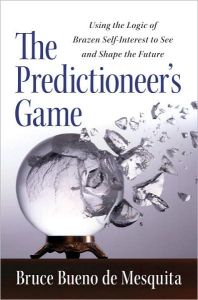Join getAbstract to access the summary!

Join getAbstract to access the summary!
Bruce Bueno De Mesquita
The Predictioneer's Game
Using the Logic of Brazen Self-Interest to See and Shape the Future
Random House, 2009
What's inside?
Forget your crystal ball – learn how to use game theory to predict, and engineer, the future.
Recommendation
Game theorist Bruce Bueno de Mesquita has a successful record of applying game theory to predicting the outcome of critical foreign policy issues. Among his other accomplishments, the author achieved a 90% accuracy rate in forecasts for the U.S. government, often about the future direction of other countries. In this book, he applies game-theory analyses to complex questions about such public policy issues as the development of nuclear weapons in North Korea, the potential for Iraq to ally with Iran, and the risk of a major war between Israelis and Palestinians. To illustrate the numerical framework of games, Bueno de Mesquita also features examples that model mundane behavior, such as shopping for cars or choosing which movie to watch. Though the book is thick with passages that focus on foreign policy, getAbstract nonetheless recommends it to executives who want to learn how experts use game theory to predict and engineer the future.
Summary
About the Author
Bruce Bueno de Mesquita is the Julius Silver Professor of Politics at New York University and a senior fellow at the Hoover Institution at Stanford University.

















Comment on this summary